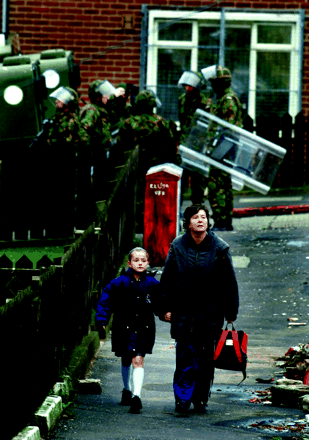Residents of Northern Ireland take 75% more tranquillizers and sedatives and 37% more antidepressants than other Britons, a study prepared for a British mental health charity indicates.

Figure. Throughout Northern Ireland, a war psychology has persisted Photo by: Canapress
Author Raman Kapur says the region's overall mental health needs are 25% greater than in the rest of the country. He blames the disparity on the Troubles — the decades of sectarian violence. Despite ongoing peace talks, he says a war psychology has persisted and people remain reluctant to talk about their fears. He says a slogan from the 1970s, “loose talk costs lives,” still holds sway in the region. “The truth,” he told the BBC, “is that loose talk heals minds.”
Although community groups work to help those traumatized by violence, their funding and scope is uneven. In May the head of Northern Ireland's Mental Health Commission, Francis Walsh, said the commission's annual budget, Can$1 million, was “a joke.”
But the region's problems are not limited to mental health issues, because Northern Ireland's health care professionals continue to be targets of violence. In August staff at the Ulster, Royal Victoria and Mater hospitals in Belfast received death threats from loyalist and republican paramilitary groups. The Catholic Reaction Force warned it would kill 6 workers, 3 at the Royal Victoria and 3 at the Mater, whom it accused of having links with British security forces. The Red Hand Defenders then threatened to kill Catholics at the Mater and Ulster hospitals if this happened. Hospital staff held a 1-hour work stoppage Aug. 6 to protest the threats, and the BMA issued a statement condemning the threats and urging their retraction. One survey determined that 500 threats were made against hospital staff in 2000. — Mary Helen Spooner, West Sussex, UK







